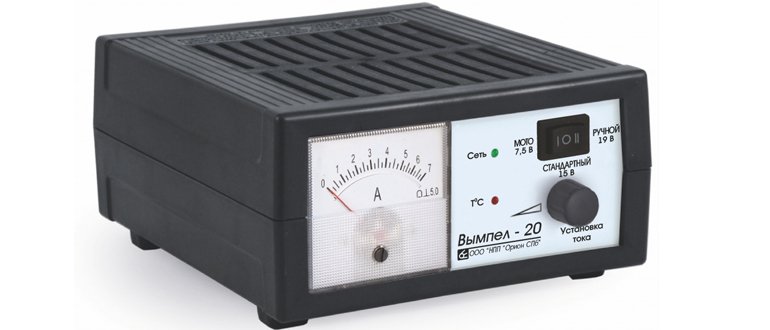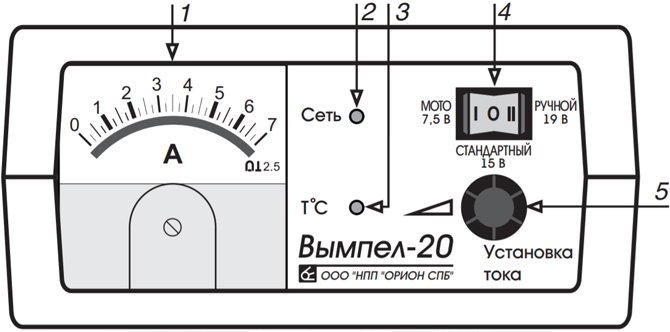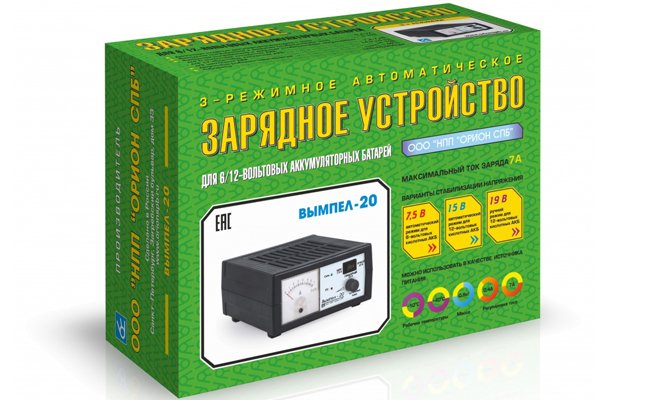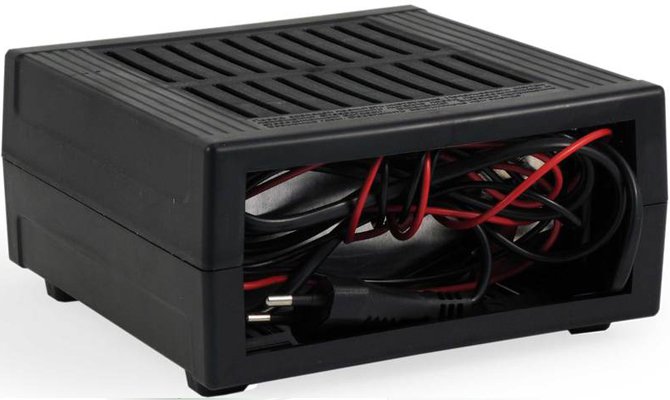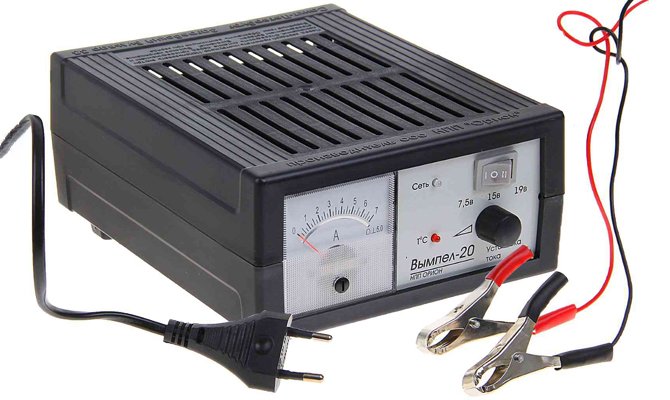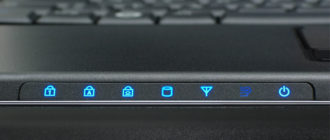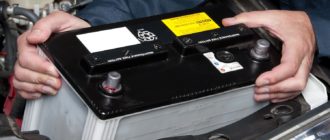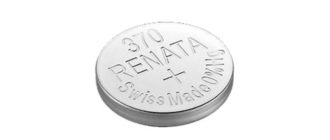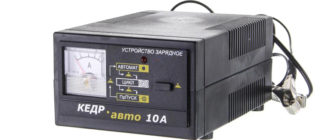The presence of a reliable charger allows you to recharge the battery at any time. Modern devices can perform battery recovery in automatic mode, but many motorists prefer to charge manually, since the machine can restore capacity only up to 80-90%. Orion Pennant 20 combines the ability of both automatic and manual charging.
Content
Device Overview
The Pennant 20 charger has a rectangular housing, inside of which is located a pulsed voltage converter. On the front panel of the device are controls for operating modes and displays. In order to control the power of electricity supplied to the battery terminals, the device is equipped with a pointer ammeter.
In the middle part of the front panel there is a power indicator that lights up immediately after the device is connected to the 220 V network. This display element changes the glow color depending on the operating mode of the device. When the voltage is set to 7.5 V, the indicator lights up in green, at 15 V - yellow and at 19 V - red.
- Ammeter scale.
- Power on LED:
7.5 V. Green, for a moto battery with a voltage of 6 volts.
15 V. Yellow, for car batteries with a voltage of 12 volts.
19 V. Red, for charging in manual mode (recommended only for experts). - Overheat indicator.
- Switch output voltage and mode in Volts.
- Regulator of amperage.
An LED is installed at the bottom of the front panel, which turns on when the temperature of the electronic unit rises above the limit values. To control the output characteristics of the charging current, to the right of the display elements there is a smooth current regulator and a voltage switching button.
Technical characteristics of the pennant 20
Ignorance of the technical characteristics of this model of the charger can lead to undesirable consequences. Therefore, each owner of a car or motorcycle needs to know the basic parameters of this device.
Specifications Orion Pennant 20:
| Characteristic | Value | |
|---|---|---|
| Voltage | 180-240 V | |
| Current Adjustment Range | 0,4-7 | |
| Output voltage in mode current stabilization | 7.5 V | 0-7.5 V |
| 15 v | 0-15 V | |
| 19 V | 0-19 V | |
| Output voltage in mode voltage stabilization | 7.5 V | 7.4-7.6 V |
| 15 v | 14.9-15.1V | |
| 19 V | 18-19 V | |
| Operating temperature range | from -10 to +40 C | |
| Dimensions | 155x85x200 mm | |
| Weight | 850 grams | |
| Ammeter | Switch | |
| Battery Voltage Rating | 6 V, 12 V | |
| Cooling type | Radiator | |
| Features: | ||
| Fully discharged battery | ||
| Use as power supply | ||
| Reverse polarity, overheating and short circuit protection | ||
The device only works on AC power with a frequency of 50 Hz and a voltage of 180 - 240 V. When using the device, make sure that the connection is made only to serviceable outlets.
Features of the device and for which battery is intended
A feature of the Pennant 20 is the presence of a voltage switch. Due to this possibility, it is possible to efficiently charge not only standard automotive batteries with a voltage of 12 V, but also batteries for low-voltage equipment with a voltage of 6 V. Thanks to the presence of a switch, it is possible to almost instantly change the mode of supply of electric current.
The minimum amperage at the terminals of the charger of this device is only 0.4 A, but even this value will be enough to apply too much amperage to batteries of small capacity. Given this feature, do not use the Pennant 20 charger to charge batteries with a capacity of less than 4 Ah.
The maximum current is 7 Amperes, so you should not try to charge batteries with a capacity of more than 70 Ah, as this will take much longer.
How to charge the battery using a pennant 20
Only with a correctly selected charging mode of the car battery can you count on a quick recovery of the battery charge. Orion Pennant 20 can work both in automatic and in non-automatic mode. Each version of the device has its advantages and disadvantages.
If the connection is carried out in fully automatic mode, then the initial setup of the device is sufficient so that during its operation it is not required to additionally control the charge recovery process. In non-automatic mode, you must constantly monitor the battery level.
In automatic mode
In automatic mode, the battery is charged according to the following instructions:
- Set the voltage selector to the “7.5V” or “15V” position (the mode is selected depending on the battery voltage).
- Connect the red clip of the device with the plus of the battery, and the black with the minus.
- Set the minimum current value.
- Connect the device to 220 V.
- Set the required charge current.
After the charge is completed, disconnect the device from the mains and disconnect the clamps.
In non-automatic mode
In order to charge the battery in non-automatic mode, you must:
- Set a charge voltage that should be slightly higher than the battery recommended by the manufacturer.
- Connect the clamps to the battery terminals, observing the polarity.
- Set the current regulator to the leftmost position.
- Connect the device to a 220 V network.
- Set the required current level.
After charging is complete, disconnect the device from the mains, and then remove the clamps from the battery terminals.
Regardless of the type of charge mode, it is not recommended to leave the included charger unattended for a long time.
Download the official PDF manual
Instructions for using the Orion Pennant 20 charger can be downloaded HERE.
You have a charger Pennant 20? Then tell us in the comments which one and about your impressions about him, this will greatly help other motorists and will make the material more complete and accurate.
Reviews
Nikolay. Khabarovsk
I bought Pennant 20 in order to charge the battery for a moped. The charger completely restores the charge of a small battery for several hours.
Igor. Krasnoyarsk
A very high-quality and inexpensive device that copes with the charge of passenger batteries.
Novel. Kislovodsk.
Pennant 20 is a good device for charging small motorcycle batteries. At the same time, the device allows you to very softly restore the charge, which significantly lengthens the battery life.

